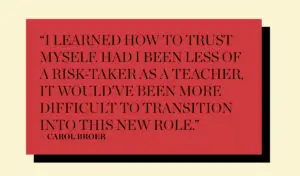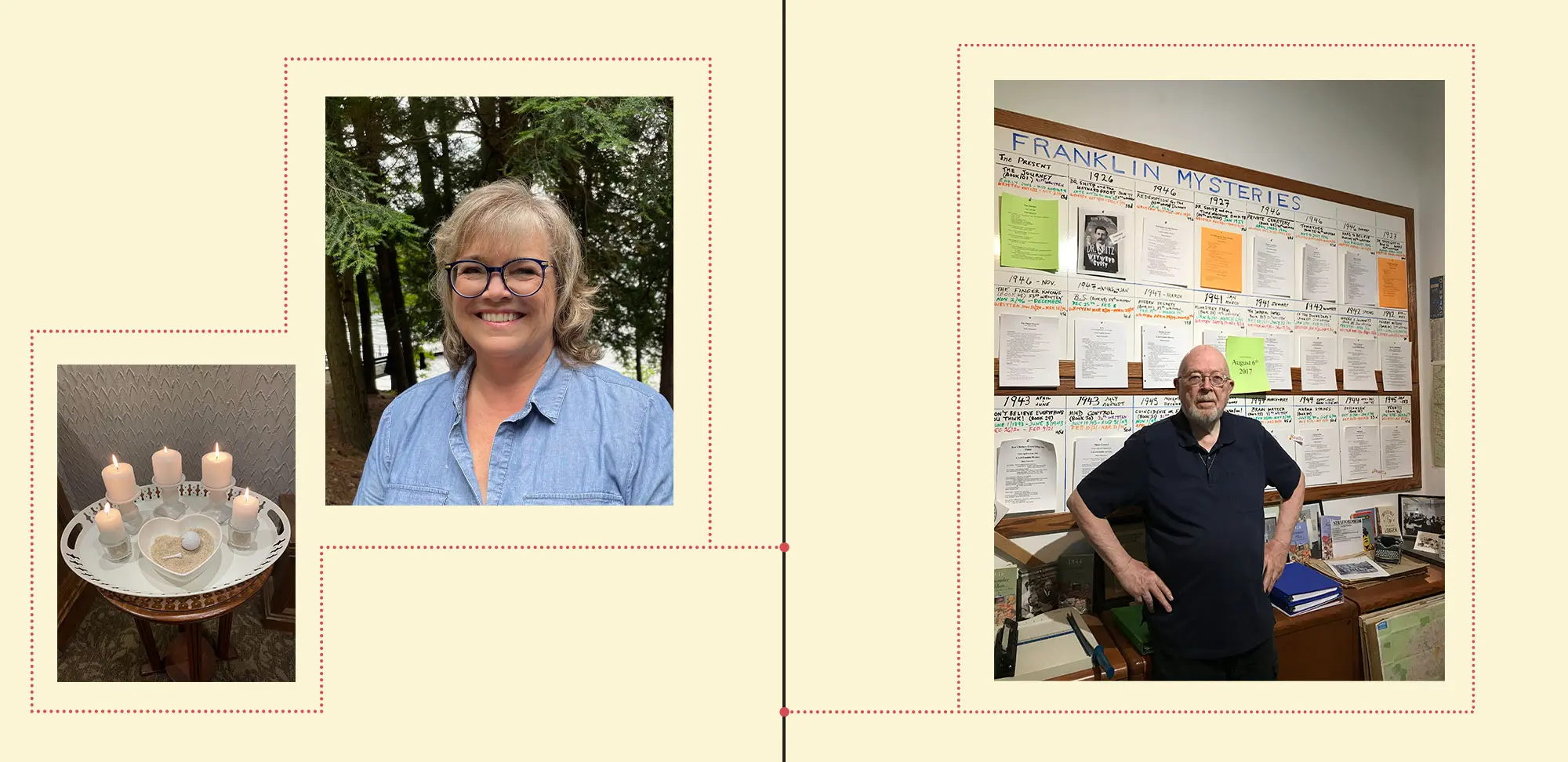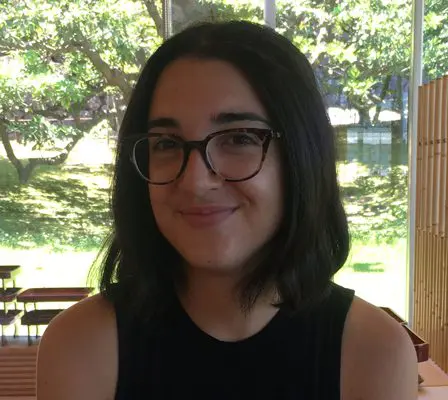For many older Canadians, retirement doesn’t mean the end of work. Instead, a growing number of retired people, especially teachers, are choosing to re-enter the workforce in new and different roles.
According to RTOERO’s 2023 Future Retirees Survey, more than half of classroom teachers and school administrators plan to work, either part-time or full-time, within five years of retiring. It’s not only about needing extra income, either. “People don’t want to stop working,” says Jim Grieve, CEO of RTOERO. “They want more control over their work – flexibility, freedom, change – and that’s something retirement can offer.”
 Caption: Photo of an arrangement Broer used for a person who loved golf, and Broer officiating a service.
Caption: Photo of an arrangement Broer used for a person who loved golf, and Broer officiating a service.
Carol Broer (District 13 Hamilton Wentworth, Haldimand) notes that teachers tend to retire earlier in life. “I found myself early on knowing that I wanted to do something engaging,” she says. “I wanted to stay in touch with people and use my skills and abilities to connect with people in a meaningful way. That’s why I decided to do something more than just golf.”
For Broer, flexibility is a priority. As a retired teacher with a deeply varied career, including 17 years as a music specialist, she’s now a self-employed funeral celebrant. “I’m not on anyone else’s timetable or schedule,” she says. “That’s the beauty: When you leave class, you get to make your own structure.”
Through her services, Broer is determined to tell the unique personal stories of those who have passed away. “I’ve been to so many bad funerals,” she says. “A good funeral tells a story and reflects the people who are there to say goodbye and honours the life that’s been lived.”
Even before retirement, Broer wanted to connect with people in a meaningful way. When she learned about funeral celebrants through a friend, she researched the career and pursued training. “I have a background in public speaking, so I could take that and see how my skills fit with the role,” she says.

Starting her own business was a “great learning curve,” she says, but considering how flexible teaching had made her, she adapted quickly. “I learned how to trust myself. Had I been less of a risk-taker as a teacher, it would’ve been more difficult to transition into this new role.” She uses her teacher skills in empathy, organization and communication to help families through vulnerable times by creating a personal memorial – more like a celebration of life rather than a traditional funeral – that she leads, similar to the role of a clergyperson, except non-denominational and without the ordained part.
Broer has one big goal for the future: to widen the understanding of funeral celebrants in Canada and deliver her own training program one day. “It’s a fairly new thing. It’s not for everyone, but [people] don’t know that this is an option.” She adds, “Most people are wondering, what exactly do you do? When I describe it, they say, ‘Wow, that’s so neat and important.’” Her advice to newly retired teachers is to consider your skill set. “What’s your joy, what brings you satisfaction and meaning and is impactful? Whatever it is, that’s what you need to pursue.”
Jason Abbott, a financial consultant in Toronto and president of wealthdesigns.ca,
explains two reasons why people are re-entering the workforce later in life. The first is financial: There may be a shortfall in savings, he says, and working lets people buy time as their savings build up.
The second reason is personal. “People need something to do,” Abbott says. While some enjoy their workplace environment, their colleagues and their routines, others are seeking something different after retirement. In the field of education, his clients have pursued private tutoring or writing, an innate choice for teachers.

Caption: Ron Finch in front of a storyboard of some of the characters in his novels.
Take Ron Finch (District 9 Huron-Perth). “I believe you’re never too old to start a new enterprise, provided you’re physically and/or mentally able. Age is not an excuse,” Finch says. After spending the bulk of his career as a high school teacher and principal from the 1960s to the 1990s in Listowel, Ont., he spent 27 years selling real estate and retired at age 75 in 2017.
He sat on his porch, ruminating on what to do next. “I may have ‘retired,’ but I was far from finished working,” Finch says. “That’s when my secret ambition surfaced. I wondered if I could write a novel. August 6, 2017, is the day I decided to write a book.”
In his first week, he wrote for a total of 75 minutes. The next week, 490 minutes. He kept track of his daily writing until he wrote his first book, Lightning at 200 Durham Street. The plot? It’s 1928, Prohibition has ended, the Great Depression is just around the corner, and The Jazz Singer – the first talking movie – has just been released. But there’s trouble in the small Ontario town of Chaseford.
At a remote cabin in the woods, 17-year-old amateur sleuth Joel Franklin and his friends have stumbled across a crime too big for Chief Petrovic and his constables to handle. As the criminal investigation expands to neighbouring cities, a wild electrical storm rips through the peaceful little community, unearthing fresh mysteries and leaving destruction in its wake.
In the six years since retiring and writing full-time, Finch has written and self-published just over 50 novels in the Joel Franklin series, with 13 currently available on Amazon and in a local bookstore. His fourth book, The Deadly Secret, just landed on Amazon. “There are another 36 manuscripts sitting on my shelves ready to go. But I enjoy writing a lot more than editing, [and] I’m not good at self-promotion.” Two upcoming novels, The Journey and Dr. Shitz and the Wayward Ghost, are a departure from the Joel Franklin series.
Most of Finch’s books take place in Southwestern Ontario: London, Stratford (“Chaseford” in his series) and beyond. But it really is all fiction, despite some parallels to real life. “You write about what’s familiar to you,” he says. “Writers reveal themselves whether they intend to or not, and it doesn’t matter if they’re writing fiction or not.”
For Finch, writing is similar to teaching. Whether they’re marking papers, creating lesson plans or researching, teachers present a narrative. “The big difference is the self-confidence and faith that comes in,” says Finch, when asked about his motivations. It helps that he was an avid reader growing up. “My mother started taking me to the library when I was three,” he says.
How does he produce such a high volume of work? “I’m willing to sit down, and I can concentrate and focus. I’m lucky that I’m able to do that.” Currently, one of his sons reads and edits all his stories. His main goal is to find a publisher and agent to spread his stories to a wider audience.
“You can, and I do [make money], but not much,” Finch says. He has harnessed a following in the meantime. “I have people who want to know – when is your next book coming out? I had one woman who was upset with me because she thinks I should publish a book every month.”
Is a new career possible post-retirement?
According to Career Toolbelt writer Kyle Elliott, post-retirement career changes are possible. “On one hand, there is a stigma that older workers are less adaptable and stuck in their ways,” he says. “On the other, older workers have additional experience and accomplishments that can set them apart from those who are earlier in their career, which you can use to your advantage in the competitive job market.”
Elliott lists several ways of transitioning to a different career.
- Be realistic about your career goals.
- Ask yourself what your requirements and preferences are.
- Be clear and cognizant about what you will and won’t settle for.
- Write out a list of your career accomplishments – you have the skills, and they’re transferable to any field.
Finally, don’t stop learning. There are many ways to hone your skills through courses and workshops. In-person classes let you connect socially, while online classes can be taken synchronously or asynchronously to fit your schedule best. Keeping in touch with your network through websites like LinkedIn can empower you on your journey. When you put in the effort and believe in yourself, you’ll be surprised where you’ll end up.











